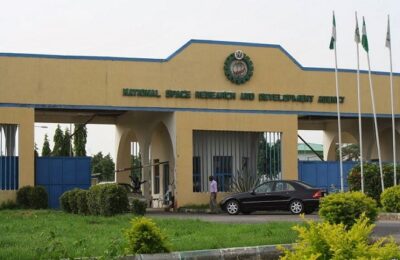The role and importance of the symbiotic relationship between the National Space Research and Development Agency (NASRDA) and the Nigerian private sector cannot be overemphasized.
This was demonstrated by the visit of the director-general of the agency, Dr. Halilu Ahmad Shaba, to the headquarters of Proforce Limited in Abeokuta, Ogun state in continuation of his consistent efforts and strategic approach towards building a robust partnerships with the private sector and relevant stakeholders in the national space programmes actualisation efforts.
The visit is apt because of its capability in mending the missing link in the effort to actualize and enhance the Nigerian space ecosystem for the benefits of its citizens.
This is evidently true in Nigeria now that the private sector especially companies and industries are now increasingly looking to space as a place of business. The NASRDA in Nigeria has been changing in several different ways since the appointment of its Director-General of the agency by President Muhammadu Buhari, especially in his emphasis on embracing the private sector as the way to go in developing new space technologies for the benefit of the country.
The next priorities of the director-general, going forward, is to have the space station of the country which is touted as a stepping-stone towards creating an ecosystem of business in orbit, so that Nigerian companies and private entities can manufacture, experiment, advertise and even build private satellites. This is because more private sector involvements in the space sector in Nigeria will lower the cost and lower the risks of doing business in the sector. How the agency drives, that is what they are doing now, which is trying to now prove the concept of the public/private partnerships and get the commercial sector involved. The envisaged only outcome of this is a positive, not only for NASRDA but for the space economy and the private sector companies in Nigeria.
That is the model the agency now wants is been replicated in the country, whether it is purchasing services from private companies for the agency or provision of developments awards so companies can develop technology that NASRDA wants to utilize. A key advise is to have NASDRA have its “Tipping point” awards, the awards will help create public-private partnerships which is critical to the agency’s future successes. The idea is to see how NASRDA can actually make use of this emerging commercial space sector. This has the potentials of eliminating the once held belief that it is just the NASRDA alone developing its technologies.
Tipping point awards has a stipulated amount that it is worth. Broadly speaking, a company or project selected for tipping point awards is to receive the agency’s resources up to a fixed amount, with the private entity paying for at least 25percent of the programmes total costs. The advantages of this is that it allows NASRDA to shepherd the development of important space technologies while trying to save the agency money. This can be actually a great example of how the private sector and NASRDA can collaborate to make certain things happen. Each batch of the tipping points awards are to be divided among multiple programmes when implemented.
The director-general’s visits to the private sector in the country pointed to the satellites segment of space technology as an example for how shifting ownerships and operations from government built and own to commercial can drive innovations, such as communications or services like satellites television can be implemented in the country for our overall benefits.
The director-general has always emphasized that the government alone cannot do it due to the numerous challenges and responsibility confronting it. For example, the early satellites all over the world we’re government own and they were limited in their scope and very expensive to build. When satellites really took off is when the commercial sector came in and this the director-general’s want replicated in Nigeria.
The private sector in Nigeria has today figured out these uses that the government never would have figured out that they can also put their satellites up there as well. The advantages in Nigeria is that the cost will come down a lot and the uses go up a lot.
Since the beginning, space was an exclusive domain of government and public organizations. The role of the private sector is becoming more and more important today and this is not only in commercial activities. However, our laws in the Nigerian space sector dealings with this subjects are still very much based on the assumption that space activities are still based and reserved for the governments. We are now about embracing the new thinking all over the globe that the role of the private sector could also includes the management’s of space infrastructures and the launch of peaceful satellites. An even wider wider roles for the private sector is being advocated. Private exploration and exploitations of space through private missions are being increasingly discussed all over the world and we should therefore make concerted effort in Nigeria’s interest not to be left behind because space is a race. This requires that the space activity in general can generate attractive returns if those business models are identified.
The evolution of space the space economy has 3 stages,each of them marked by different involvements of the privates sector actors the world over.The first phase was characterised by governments space programmes.The second phase instead was marked by the gradual involvements and entry of the private actors,being favored by the changes in technologies and political strategies,The third phase is to see to a progressively higher participation of private companies in space activities.
The director-general’s continuous visits to the private sectors in Nigeria is to sustain all efforts to put Nigeria in a vintage position in the areas of space technology. Hevis now developing and building the much needed confidence between the public and the private sector because today, the daily life of almost every individual and companies depends on one or more satellites activities all over the world and Nigeria is not an exception. The lack of progress in these direction would push our national industries and companies to find riches in larger markets to grow and compete internationally. Kudos to the director-general’s of NASRDA for walking the talks in this direction.
– Musa Wada writes from Abuja.




